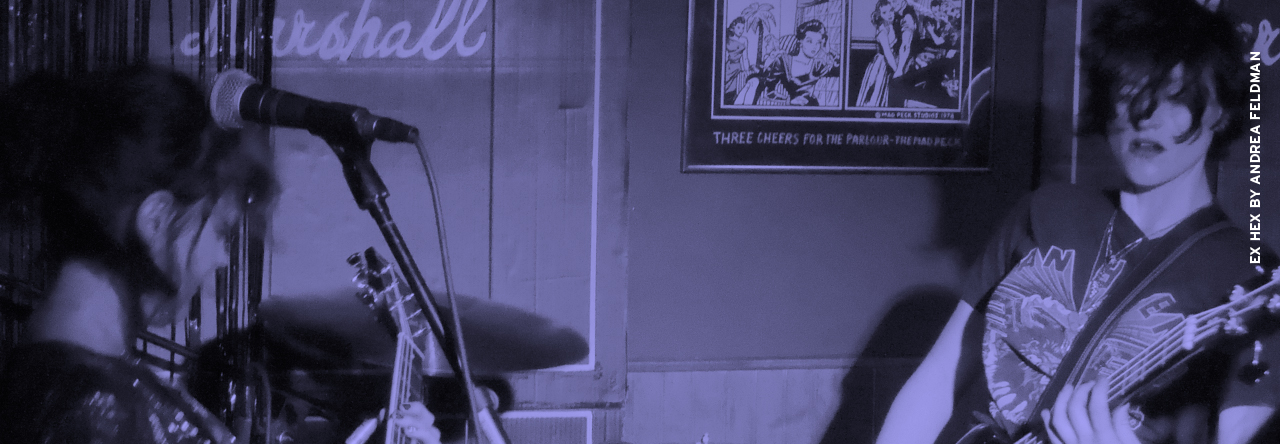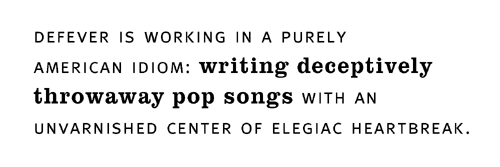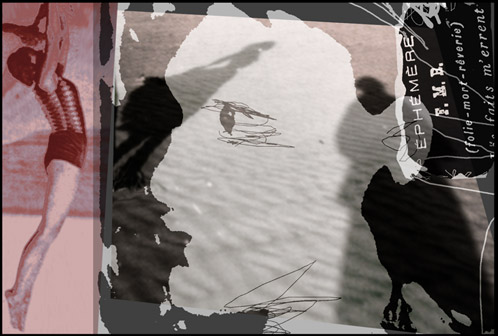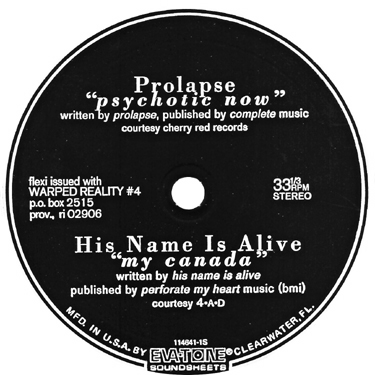 I once compared Warn Defever to Max Ernst. This was way back, King of Sweet-era, even, and I thought of him as this mad genius who played with repetition and texture in the most fascinating ways,
I once compared Warn Defever to Max Ernst. This was way back, King of Sweet-era, even, and I thought of him as this mad genius who played with repetition and texture in the most fascinating ways,
creating a body of work that felt marvelously out of time. Even if it had discernable stylistic earmarks here and there, they were difficult to pinpoint amidst the dense sonic collages.
Fast-forward to 2006’s Detrola. We’re not in sepia-toned Ernst-land anymore, nor have we been for quite some time. But the fascination with repetition and texture is still there, even if, over time, the influences have become more obvious. Defever is working in a purely American idiom: writing deceptively throwaway pop songs with an unvarnished center of elegiac heartbreak. He gets purely bright, bubbly American voices to sing them. (Detrola features three singers: Erika Hoffmann, Lovetta Pippen, and newcomer Andy FM.) There are occasional echoes of the early His Name Is Alive sound—Detrola opens with the mournful, bleak “The Darkess Night,” which is anchored by cello, downbeat saxophone, drones and bells (an unexpected but lovely accent). From there, though, it’s anything goes as Defever casts his seemingly omnivorous range of influences far and wide across the album’s eleven tracks. The dominant strain of influence appears to be 70s MOR —think Carole King, the Carpenters, Memphis soul. It’s a tribute to Warn’s talent that the music never comes off as mere pastiche or as slavishly imitative —everything he touches he makes his own. And he does so in a quietly audacious, ego-free way.
HNIA albums sometimes remind me of that famous quote about the weather in San Francisco: “If you don’t like it, wait a second and it’ll change.” Detrola is no different, making stylistic leaps from song to song —from the unerringly Carpenterish “Get Your Curse On” to the soulful, funkified “I Thought I Saw” and closing with the mournful “Send My Face To Your Funeral.” But it’s Warn’s stylistic fearlessness and wry sense of humor that makes his albums such a consistent delight, even if you sometimes wish he were a bit more disciplined. But then, he wouldn’t be Warn and we’d miss his aesthetic omnivorousness. After all, who else is going to aim for sounding like “Dead Moon-meets-Pharaoh Sanders” (and succeed)?! I ask you.
Warn very kindly submitted to my line of questioning. Here’s what he had to say…
It seems as though with every HNIA album there’s a new HNIA —not just in sound, but in personnel, instrumentation, aesthetic presentation, everything. This seems like one of the most full- bodied, well-integrated HNIAs we’ve seen in awhile. How did HNIA mach 2005/6 come together? How did you find (relatively) new singer Andrea? Or do people find you?
These are tough questions with days and days worth of answers, so I’ll try to answer them in an abbreviated style: I spent the last couple years primarily recording other bands in the studio I opened in detroit, called BROWNRICE. One of the bands I recorded was Detroits’ most super punk ass band called the Piranhas. The Piranhas are the kind of band where the singer takes off his pants and pees into a trombone and then plays the trombone and tries to shoot pee all over you (in the studio). Last year I had a party and they all came over my house and when all the alcohol was gone, we started drinking the brown smelly water at the bottom of the flower vases (we didn’t die). Then Ian (the Piranhas’ guitar player) and his girlfriend (Andy FM) started singing me Elvis songs as a birthday present. It was great!!! I asked them if they wanted to record a tribute to Elvis and Andy said she hated Elvis. So I wrote some new songs just for her to record, next thing you know….. >>cont’d
Every HNIA album feels to some extent like a mix tape made for a (possibly errant, erratic, or otherwise elusive) lover. If Someday My Blues… was the breakup album, Detrola is the _______? And, if it’s hard to simplify like that, what was your intent?
It’s not really like a mix tape, it’s like a mixed up tape.
Detrola seems like your take on the classic American MOR songbook (Carole King, the Carpenters, etc.). Was this a new challenge you set for yourself, or a natural evolution? Is there such a thing as a platonically perfect American musical vernacular? You seem to be so comfortable in all these different idioms, trying them on for size, subverting them, chopping them up Tzara-style into something that’s got your particular stamp on it. It seems, in a way, like you’ve been making mash-ups from the very beginning of HNIA’s existence. How would you characterize HNIA’s evolution?
I guess I don’t really think about it that much. In the past I think I tried really hard not to repeat myself. Like everything has to be constantly moving. For Detrola I tried to stick to what I already knew, like my comfort zone. Although I guess when I actually try to remember what was going on I think its really the same every time.
I start a new song and it’s like a totally blank piece of paper and I have no idea what I’m doing and that I have learned nothing over the years and I can’t even remember what music is supposed to sound like.
How has Detroit shaped your sound? Can you imagine HNIA existing anywhere else? Speaking of Detroit influences, did you really record the Stooges recently, or is that a bit like how Simon LeBon “produced” Unrest’s Perfect Teeth?
Question disqualified on grounds that it is really two or three questions in one.
Do you listen to your own music with a critical ear, or is it possible to lose yourself in it?
The time that I enjoy my own music the most is while I’m working on it, in the studio. I usually don’t go back and listen to it, but if I do the worst part is always my own performance especially if I try to sing.
Have you ever surprised yourself with something you’ve written? Maybe you played it back later and thought, “I wrote that?!” Was it a happy accident you later tried to incorporate into your palette, or did it find its way into your working methods in some other way?
It’s usually the opposite, I hear something that someone else did and I think “I wrote that” but it always turns out to have been written or recorded ten to twenty years before I was even born, and then I try to figure out how George Gershwin was able to build a time machine go into the future and steal all my ideas and then go back to the 1920’s and write “Rhapsody in Blue.” This happens a lot.
Pop-culture item(s) that mean(s) a lot to you (that’s not music)? (book, poem, film, beautiful hand-painted sign, etc.) Do you first have the first beat-up cassette/45/8-track/stone carving you ever owned? What was it? (Mine was Nena, “99 Luftballons.” C-30, C-60, C-90, go!)
ELO “Out of the Blue” was the first or second album I bought myself but I do have a hazy recollection of going in halfs with my older brother on a ZZ Top album too… I think it’s all pop culture: cell phones, elvis, internet, text messages, hotspace, eating, books, buddhism, cambodia, whatever. It’s how you take it in. If you’re all super-serious about something then it ceases to be pop culture —like all the critical analysis we’re seeing lately about 80’s hardcore scene. But since I take nothing seriously it’s all pop culture to me.
When you’re young you (usually) digest music in a fairly non-discerning fashion (ie, passively). What song or band marked a turning point for you, when you realized there was a real power & expressiveness in music?
I started playing music at an early age with my family and the first real music I discovered on my own was Elvis and then rockabilly and surf music. I had grown up surrounded by music —country, western, polkas, waltzes, but that wasn’t really my own thing. When I first heard Elvis I couldn’t believe the energy and raw power. It’s hard to explain why I was in some sort of time warp or whatever…
The late Egg Magazine’s music reviews consisted solely of the dollar amount they thought the album was worth. How would your most recent music purchases shake down for cash based on aesthetic & artistic, not retail worth? (Bonus: How’d you rate HNIA’s oeuvre?)
I think it should be free if you’re under thirty years old. If you’re older you should have to pay.
***
![]() The Pine Cone II from the Cloud Box Sampler[right-click-save-as, s’il vous plaît]
The Pine Cone II from the Cloud Box Sampler[right-click-save-as, s’il vous plaît]
![]() Reincarnation (Early Music version)”
Reincarnation (Early Music version)”
![]() Get Your Curse (Summerbird version)
Get Your Curse (Summerbird version)
For His Name Is Alive news, tour dates, and free downloads, visit their official website. For more goodies take a look at Silver Mountain. Detrola is available at fine retailers everywhere.







